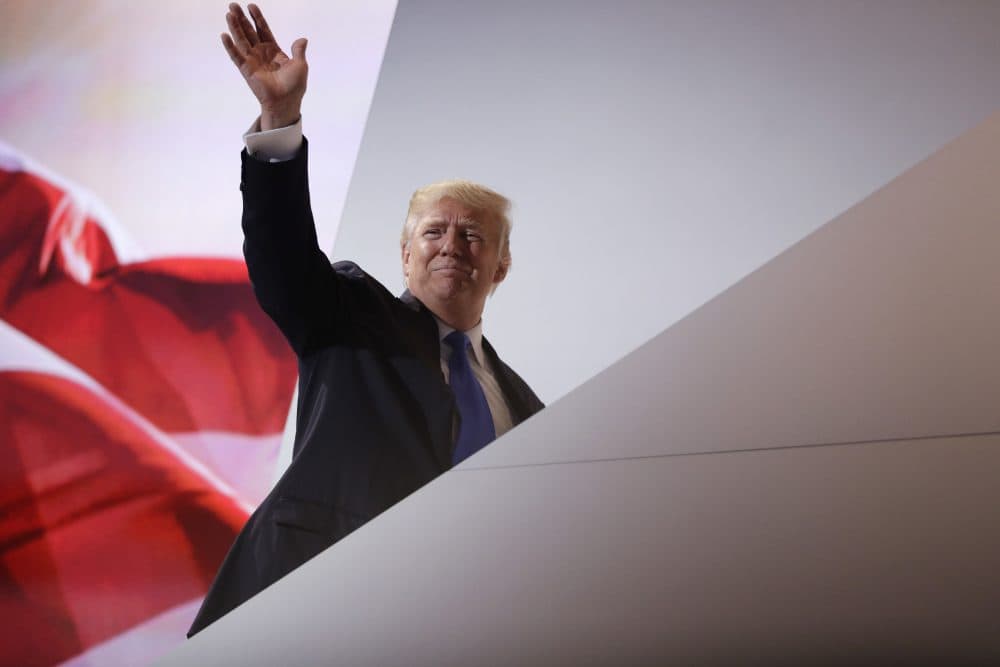Advertisement
Trump's War On 'Political Correctness' Is At The Center Of His Appeal

CLEVELAND, Ohio — Donald Trump's remarkable journey from billionaire political insurgent to Republican Party presidential nominee has come in spite of — or perhaps because of — his tendency to speak his mind, even at the risk of offending lots of people.
In fact, throughout his campaign, it seems as though Trump has waged war on political correctness — a war that has delighted and energized many GOP delegates.
There's a long list of people and groups Trump has insulted over the course of his campaign. Among them: Mexicans, Muslims, women, the disabled, the media -- even the pope.
When he began his campaign, that he could offend so many and continue to climb in the polls baffled political observers and frustrated his opponents, including Jeb Bush.
"Do you want a president that disparages women, Muslims of all kinds, people with disabilities, Hispanics?" Bush said in New Hampshire in January. "I mean, we're getting down to about 90 percent of all people here. At what point do we say, 'Enough of this!'?"
Well, Trump's supporters couldn't get enough of it. It's been clear for months that Trump's unfiltered, blunt style is a political asset. Many delegates here in Cleveland see it as a welcome antidote to what they regard as stifling political correctness.
“For somebody like me, who can be a little mouthy, to have people say, 'You can't say that.' I’m like, what? And I was like falling in line with that — listening to people around me with all this PC nonsense," Dianna Ploss, a Trump delegate from Massachusetts, said at a Republican breakfast in Cleveland this week.
Ploss is a former Democrat who says she's one of the millions who was drawn to Trump precisely because of his willingness to tell it like it is.
“I don’t look at what he says as much as the effect that it has — and he's gotten a lot of people," she said. "Listen, I was a Democrat two years ago, I’m now a registered Republican. That says something! I mean, seven months ago I was a volunteer, now I’m a delegate in the convention! I get chills. Give me a break!”
Advertisement
On the campaign trail Trump rarely passes up an opportunity to slam what he sees as an excess of political correctness — like in his famous, or infamous, response to a question from Fox News' Megyn Kelly during a debate in New Hampshire last August:
Kelly: "Your Twitter account has several disparaging comments about women's looks. You once told a contestant on 'Celebrity Apprentice' it would be a pretty picture to see her on her knees. Does that sound to you like the temperament of a man we should elect as president?"
Trump: "I think the big problem this country has is being politically correct. I've been challenged by so many people and I don't frankly have time for total political correctness. And to be honest with you this country doesn't have time either."
John Pyle, a delegate from Kansas, says the country has gone "way overboard" on political correctness.
"Anybody’s comment about Islam, Islam terrorism, then everyone takes that wrong because they think it's a major indictment of all Muslims and that’s not it at all," Pyle said on the convention floor this week. "The border, you know, nobody is really against legal immigration. The problem that we’re talking [about] is illegal immigration."
Pyle believes that political correctness prevents important conversations on these issues from happening.
"Because the minute you start talking about the border they just think you’re going way overboard or you're racist once again on another issue,” he said.
Pyle originally supported Ted Cruz, but says he welcomes Trump's willingness to speak bluntly about tough issues. But some of the delegates here have a different view.
"He’ll speak a statement and the press will say, 'Oh, that’s politically incorrect.' Then the next day he’ll switch the statement. I think what he is actually losing is truth," said Steven Bayes, a delegate from central Illinois and a Cruz supporter.
Bayes argues that Trump too often uses controversial language to mask an inability to make a coherent argument. Bayes says Trump's style of "blunt talk" wouldn't get him very far in Illinois farm country.
“Like if he was a hog farmer, he wouldn’t make a good hog farmer because he doesn't have honesty," Bayes said. "He can’t focus on the issue of raising those hogs, getting them to market. He’s just constantly talking — constantly, constantly. And they say that’s his strong point. But I don’t think it is.”
But Ken Cope, a delegate from Midlothian, Texas, gives Trump a little more credit than that — and says he's appealing to a broad desire across the land for straight talk.
“It’s one of the reasons he has 13 million votes,” Cope said.
But Cope says what helped Trump win the nomination this week might not be as effective in the months ahead.
“He’s going to understand that his words do have an effect in a much broader scope than what he ever thought," Cope said. "Which means you have to be a little more refined in how you’re saying things.”
In other words, Trump might benefit from embracing just a little political correctness.
This segment aired on July 21, 2016.
